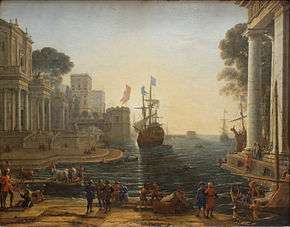Chryseis

In Greek mythology, Chryseis (/kraɪˈsiːɪs/, Ancient Greek: Χρυσηΐς, Khrysēís, pronounced [kʰrysɛːís]) was a Trojan woman, the daughter of Chryses. Chryseis, her apparent name in the Iliad, means simply "Chryses' daughter"; later writers give her real name as Astynome (Ἀστυνόμη).[1]
In the first book of the Iliad, she has been enslaved, as a war prize, by Agamemnon who admits she is finer than his own wife Clytemnestra and refuses to allow her father, a priest of Apollo, to ransom her. Apollo then sends a plague sweeping through the Greek armies, and Agamemnon is forced to give Chryseis back in order to end it, so Agamemnon sends Odysseus to return Chryseis to her father. Agamemnon compensates himself for this loss by taking Briseis from Achilles, an act that offends Achilles, who refuses to take further part in the Trojan War. A later Greek legend, preserved in Hyginus' Fabulae, states that she had a son by Agamemnon. In medieval literature, Chryseis is developed into the character Cressida.
See also
- I Modi, a work of art which depicts her
References
- ↑ Scholia on the Iliad; Hesychius, Lexicon; Malalas, Chronographia 100; Eustathius of Thessalonica, Commentary on the Iliad 1.123.9 van der Valk.